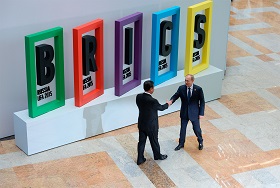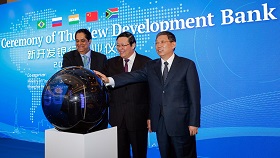China's tasks and approaches to building a new world order are fully in line with Russia's interests. In particular, the main objectives are the maintenance of peace and stability in international relations, the improvement of global governance of the global economy, the complementary development of the BRICS countries, and the increase in humanitarian exchanges.
The summit is unusual, because, firstly, it emphasizes China's new role in the world and, secondly, it is held at a time when security agenda comes to the forefront. The summit will provide a good opportunity for the leaders of the major emerging powers to discuss most pending issues.
The meeting of BRICS Ministers of Industry on July 29, 2017, in Hangzhou ended in signing the Action Plan to deepen industrial cooperation between the states of the association. The plan states seven basic directions for further development of industrial cooperation within the BRICS framework.
The work of BRICS New Development Bank (NDB) is particularly significant in this way, and in 2017 it has adopted a development strategy that determines how the NDB is going to fulfill its mandate in the following five years.
The most important innovation in the development of BRICS is, of course, China’s idea to include extra-regional players in the dialogue in the «BRICS+» and «BRICS++» format. China proposed a revolutionary idea — to create some permanent «circle of friends» of BRICS, observers or dialogue partners who would interact with the association on an ongoing basis.
It should be recognized that, given the economic situation — like the slowdown in economic growth in many BRICS countries and even its downturns, as well as political factors such as deteriorating situation in Brazil and South Africa, the growing tension between Russia and the leading Western countries, BRICS is being seriously challenged.
Economy and especially finance are the basis for BRICS progress. Though the role of political factor, political superstructure (the «sails» on a large ship of the world economy) is critical. Comparing the global economy to a large ship, it is important that the sails on this ship look in the same direction.
The ninth BRICS Summit held on September 3–5, 2017, in Xiamen and chaired by China goes under the theme «BRICS: Stronger Partnership for a Brighter Future».
The second round of the chairmanship is on, and a decade of successful cooperation development within BRICS in such key areas of interaction as policy and security, economy, trade and investment, agriculture, science and innovation, education, health, culture, etc. has passed. The first summit of the heads of state from Brazil, Russia, India and China (BRIC) was held on the initiative of Russia in 2009 in Yekaterinburg. The format was considered successful, and summit meetings became annual. In 2011, the most economically developed state of Africa, South Africa, became an official member of the association at the summit in Sanya (PRC) with the aim of strengthening South-South cooperation, thus giving a finalized look to the informal dialogue of the five developing countries under the name «BRICS». The main task of the association is not economic integration, but reformatting international relations in order to increase the influence of the emerging countries — new centers of power. However, one might argue that the development of BRICS is going smoothly, concerning not only the positioning of the BRICS in the world, but also the relations among the member states themselves.
What will China's Chairmanship in BRICS Bring?
China's tasks and approaches to building a new world order are fully in line with Russia's interests. In particular, the main objectives are the maintenance of peace and stability in international relations, the improvement of global governance of the global economy, the complementary development of the BRICS countries, and the increase in humanitarian exchanges. Numerous new branches of cooperation are being activated, such as interaction between regions, interaction in the field of international information security, tourism, energy, etc. Particular attention is paid to strengthening the role of BRICS in the context of interaction at the level of major international organizations (UN and WTO) and platforms (G20). According to Sergey Ryabkov, Russian Sherpa in BRICS, all in all, participation in such format as BRICS creates a multiplier effect and allows to expand countries' capabilities in solving not only external but also internal issues and tasks in a number of fields — from strengthening and ensuring security both on the borders and on a global scale to creating favorable investment climate in order to implement strategically important infrastructure projects.
The summit is unusual, because, firstly, it emphasizes China's new role in the world and, secondly, it is held at a time when security agenda comes to the forefront. The summit will provide a good opportunity for the leaders of the major emerging powers to discuss most pressing issues.
The meeting of BRICS Ministers of Industry on July 29, 2017, in Hangzhou ended in signing the Action Plan to deepen industrial cooperation between the states of the association. The plan states seven basic directions for further development of industrial cooperation within the BRICS framework. In addition to standardization and cooperation development within the framework of the BRICS-UNIDO Consolidated Industry and Technology Platform, the document also sets out such goals and directions for development as increasing industrial cooperation between countries (creation of an «industrial technology exchange network»); improvement in coordination processes and comparison of the adopted industrial policies and development strategies; promotion of cooperation in the field of industrial infrastructure development; greater cooperation in the field of innovation and technology, as well as providing assistance to small and medium-sized businesses, which should give an additional impetus to strengthening the interaction among the BRICS countries in the era of Industry 4.0.
The work of BRICS New Development Bank (NDB) is particularly significant in this way, and in 2017 it has adopted a development strategy that determines how the NDB is going to fulfill its mandate in the following five years. The main objective, based on the progress achieved since July 2015 when it was launched, is to make NDB a reliable provider of services to enhance cooperation development and a financial intermediary, who would protect the assets of investors and shareholders. NDB has already approved the first project on the territory of Russian Federation estimated USD 100 million: construction of a small hydroelectric power station in Karelia with a design capacity of 50 MW.
What is the main purpose not only of the Summit, but also of China’s chairmanship in BRICS?
The most important innovation in the development of BRICS is, of course, China’s idea to include extra-regional players in the dialogue in the «BRICS+» and «BRICS++» format. This was announced at the beginning of 2017 by Chinese Foreign Minister Wang Yi. And this is China's great contribution to the development of BRICS as a global format that deals not only with the affairs of the «five» itself, but also with solving global issues involving the largest and most influential countries. Recalling that BRICS so far, since the summit in Durban (South Africa) in 2013, has had a habit of inviting countries of the region in the outreach format where the chair-state had the greatest weight and respect. For South Africa, these are African countries, for Latin America — UNASUR countries, for Russia — CIS and SCO countries, etc.
China proposed a revolutionary idea — to create some permanent «circle of friends» of BRICS, observers or dialogue partners who would interact with the association on an ongoing basis. And these should be not the countries of the region, but representatives of other regions. In 2017, Mexico was invited to the BRICS summit as a representative of Latin American region, Guinea would represent the African Union, Egypt would represent North Africa, Tajikistan became the representative of the Eurasian space, and Thailand — of South-East Asia. It is unknown, whether these countries will become permanent partners. However, the process was launched.
From China’s point of view, BRICS is a valuable platform for the development of South-South cooperation within the developing world. Although Russia is historically a country of the North, it doesn’t deny this idea of BRICS. We hope that this experiment will be successful too, because BRICS+ and BRICS++ concepts are not limited to a one-time dialogue, but imply formation of a mechanism for permanent institutional interaction of partner states with the main BRICS members in the following years, both in general political format, and in sector-specific areas of cooperation.
It should be recognized that, given the economic situation — like the slowdown in economic growth in many BRICS countries and even its downturns, as well as political factors such as deteriorating situation in Brazil and South Africa, the growing tension between Russia and the leading Western countries, BRICS is being seriously challenged.
Firstly, the formation of BRICS caused opposition both in Western countries and among supporters of the «universal model of development» and Westernization in the countries within the union. There is an ongoing information war against BRICS; India, leading in terms of economic growth, is constantly being contrasted to Russia and China, different from India in values and political ambitions.
Secondly, BRICS critics claim that the association lost its momentum and therefore is no longer relevant. However, this is not the case: the fading of interest in this format is not observed in any of the partner countries. Primarily, BRICS carries political content in order to enhance the role of the five countries in global governance and to be not only rule-takers, but also rule-makers in global governance. It is precisely in the face of difficulties that BRICS countries need mutual support, as never before, to jointly achieve goals that they are not able to realize on their own.
Thirdly, there is certain tension among BRICS countries, especially between China and India, which, of course, puts the unity of BRICS to test. Although BRICS factor is not the only thing that can keep India and China from deploying a full-scale conflict, it is the association of BRICS that can play the role of a mechanism for resolving such disputes and prevent new conflicts after meeting of the leaders in Xiamen. Certain contradictions between Russia and India are associated with the support of Pakistan and a number of issues in the area of military and technical cooperation.
The interests of resource producing countries and consumer countries also rarely coincide. In this regard, there is a number of contradictions with both Brazil and South Africa. The countries are at different stages of development and have different economic strategies, not to mention different political systems. However, despite these differences, the states have common interests that they want to implement together. BRICS platform is a good format for peaceful interaction, that creates an atmosphere of mutual attraction and communication, the diplomatic atmosphere that is so important for resolution of long-running conflicts.
Economy and especially finance are the basis for BRICS progress. Though the role of political factor, political superstructure (the «sails» on a large ship of the world economy) is critical. Comparing the global economy to a large ship, it is important that the sails on this ship look in the same direction. Unfortunately, now these sails are perpendicular to each other because of political differences among the partner countries, which causes economic slowdown.
It seems that in order to solve these complex tasks the unification of BRICS should strengthen its institutionalization. There is a need for coordination both at technical level through creation of a secretariat and at the level of practical organizations, departments, companies, and businesses that are engaged in BRICS markets. For example, it is important to create a single BRICS payment system, a wider application of national currencies in transactions. What might help is the creation of an intergovernmental committee within BRICS at the level of deputy prime-ministers that would unite bilateral committees of these countries and conduct coordinated activities to guide the economic processes taking place in BRICS.









